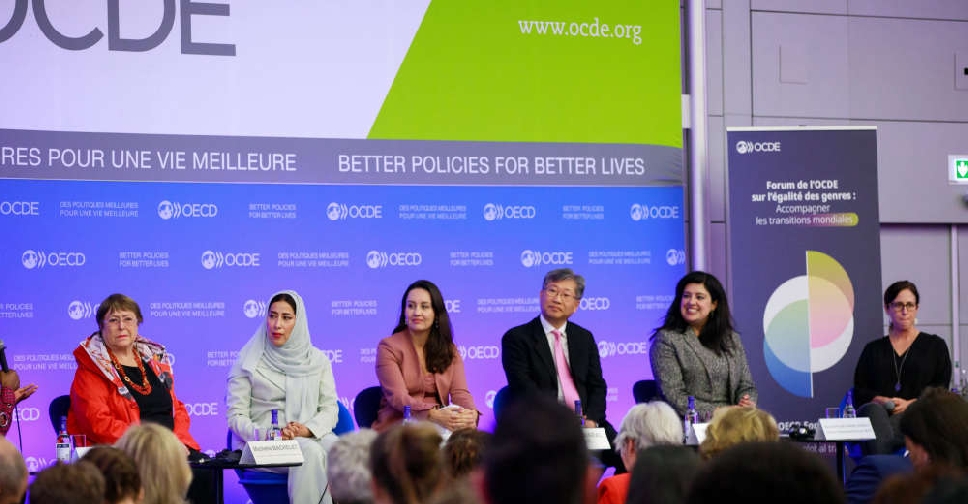
The UAE Gender Balance Council participated in the Organization for Economic Co-operation and Development (OECD) forum on “Gender Equality: Navigating Global Transitions”, held in Paris.
The two-day event explored strategies to advance gender equality amid global changes in sustainability, energy, climate and the rapid pace of digital transformation.
Participants highlighted the importance of collaboration and development to ensure gender equality in the digital age as well as in the area of sustainable initiatives.
Mona Ghanem Al Marri, Vice Chair of the UAE Gender Balance Council, attended the OECD session on “Leveraging Government Tools and Data for Inclusive Global Transitions”.
This session explored how governments can adapt to green and digital transformations to achieve gender equality and overcome related challenges.
He highlighted the obstacles and opportunities these transitions present, proposing practical steps governments can take.
Key topics covered during the discussions included how policies, programs, initiatives and cutting-edge technologies can help close gender gaps and ensure effective budgeting to improve green and digital agendas alongside gender balance initiatives. sexes.
Al Marri highlighted the commitment of the UAE Gender Balance Council, led by Her Highness Sheikha Manal bint Mohammed bin Rashid Al Maktoum, to forging impactful global partnerships.
She highlighted the UAE’s commitment to promoting gender balance globally, particularly in the areas of technology, environment, sustainability and green economy, and also highlighted efforts to increase women’s participation in leadership and decision-making roles.
The session brought together an impressive group of speakers, including Michelle Bachelet, former president of Chile; Elsa Pilichowski, director of public governance at the OECD; Elisabeth Baume-Schneider, Swiss Federal Councilor; Renata Vargas Amaral, Secretary of International Affairs and Development, Ministry of Planning and Budget, Brazil (G20); Young Tae Kim, Secretary General of the International Transport Forum; María del Pilar Garrido Gonzalo, director of development cooperation at the OECD; and Susan Snider, vice-president of strategy, innovation and impact at the Equality Fund.
. @malmarrivice president of @UAEGBC, participated in the OECD session on “Leveraging government tools and data for inclusive global transitions”. The session explored how governments can adapt to green and digital transformations to achieve gender equality and overcome… pic.twitter.com/h5o4iExRX6
– Dubai Media Office (@DXBMediaOffice) June 13, 2024
Advanced technology and durability
Al Marri highlighted that the UAE has fostered an enabling environment for women’s participation and leadership in green and digital transformations through various policies and initiatives.
The UAE’s overall strategy focuses on strengthening the empowerment of Emirati women and gender balance across several sectors, including the green and digital economy.
She also highlighted the “Framework for Gender Balance in the 4th Industrial Revolution” initiative launched by the UAE Gender Balance Council. Developed in collaboration with the World Economic Forum, this initiative is a global guide to help governments, the private sector and academia effectively achieve gender balance and create a more equitable future.
The UAE government also launched the ‘National Coders Program’, which aims to build the capabilities of 100 Emirati women in artificial intelligence technologies.
Additionally, the Women in Sustainability, Environment and Renewable Energy (WiSER) initiative supports talented women and prepares them to become leaders in sustainability and renewable energy.
More than 100 women from 30 nationalities have graduated from this initiative, and an annual forum is organized to encourage innovative solutions for women leaders in sustainable development.
The UAE has one of the highest rates of female enrollment in STEM majors and programs, with women making up 56% of public university graduates in these fields.
Al Marri stressed that the representation of women in leadership positions in these fields is crucial to attracting more women to these fields. Currently, women represent approximately 29 percent of ministerial portfolios in the UAE government, reflecting a high level of female representation.
Recognition programs
During her speech, Mona Al Marri highlighted the importance of recognizing institutions that integrate gender parity policies into their strategies.
She highlighted the UAE National Gender Balance Index, an annual recognition program that honors individuals and entities that support gender balance nationally.
The “SDG 5, Commitment to Accelerate Women’s Leadership in the UAE Private Sector” initiative, signed by over 64 international and local institutions in various economic sectors, was also highlighted.
This commitment commits to increasing the participation of women in leadership positions to 30 percent by 2025.
Al Marri highlighted that the UAE is actively improving data collection and analysis on gender inequality in various areas, including the green and digital sectors. This data is essential for measuring progress and helping decision-makers implement effective policies to promote gender balance.
Gender-responsive budgeting
Addressing critical measures needed to ensure budgetary efficiency in promoting green and digital transformations alongside gender balance, Al Marri highlighted that mainstreaming gender balance in budgets positively responds to the needs and the demands of women.
She highlighted the importance of allocating funds to educate women in STEM fields and train them as leaders in green industries, thereby creating gender-inclusive budgets. At the national level, the UAE Gender Balance Council, in collaboration with the Ministry of Finance, worked on a gender-responsive budget project.
Cooperation with the Organization for Economic Cooperation and Development
On the sidelines of the forum, Al Marri met Ulrik Vestergaard Knudsen, Deputy Secretary General of the OECD.
They discussed opportunities to strengthen the partnership between the UAE Gender Balance Council and the OECD, building on their relationship since the creation of the Council in 2015.
Key initiatives include the launch of the Gender Balance Guide, which presents globally applicable tools to improve women’s participation, and their collaboration with the Global Council for Goal 5 of the Sustainable Development Goals to develop a toolkit for advanced global practices in gender balance.
Both sides reaffirmed their commitment to maintaining close relations and advancing efforts to improve gender balance regionally and globally.
. @UAEGBC participated in the Organization for Economic Co-operation and Development (OECD) Forum on “Gender Equality: Navigating Global Transitions”, held in Paris on June 10-11. This vital forum brought together leaders and experts from governments, the private sector,… pic.twitter.com/JNC2ojsLth
– Dubai Media Office (@DXBMediaOffice) June 13, 2024
